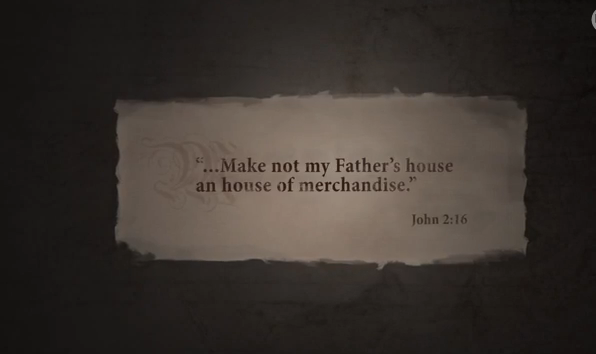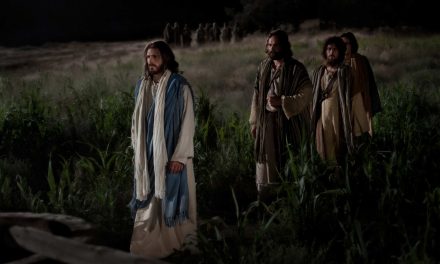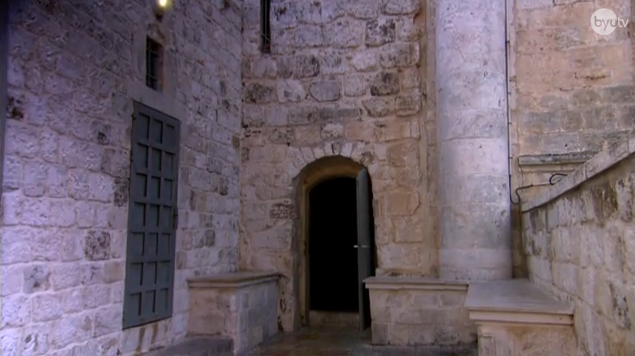KAYE TERRY HANSON: As He learned, grace for grace and line upon line, this is the place where He begins to understand what it is He has to do. And He comes from that fasting, absolutely physically starving for sustenance. And exactly at precisely that point, Satan strikes.
ROGER R. KELLER: Some scholars tend to see this as solely psychological. We want to be sure that we understand that Satan was really there, and that this was a real challenge to Jesus. Certainly it was psychological too, for it had to be a battle that He had to fight with Himself over how was He going to fulfill what God had called Him to do. Now on the surface, this challenge to turn the stones into bread certainly would answer His particular hunger, but I think that’s a more superficial understanding of something that is much deeper here. Jesus had the power, if He wished, to feed the world. It was a world composed of people who were hungry and starving, and who had tremendous need. Now could He use His power and authority in that particular way to feed them, or would He feed them in a different way, spiritually?
S. KENT BROWN: Jesus, of course, pushes it aside by quoting scripture. He says, “It is written, That man shall not live by bread alone, but by every word of God” (Luke 4:4). Out of this scene, there is a pointer back just months ago, to when John said to an audience, Begin not to say within yourselves, We are children of Abraham. “For I say unto you, that God is able of these stones to raise up children unto Abraham” (Luke 3:8). So Satan is saying to Jesus, It must be somewhat simple, and if you are the Son of God, as John has promised, take one of these stones and create a child. There’s a more distant reference I think, back to the creation, when Jesus as Son of God and Creator, of the dust of the earth created a man, whom he called Adam. So in effect Satan is saying to him, If you’re able to create a man at one time from simple dust, how about just bread from a simple stone?
 KAYE TERRY HANSON: Now remember this, the second temptation we get an account about is where the Savior goes with Satan to the pinnacle of the temple. By the way, the Bible says in that place, that Satan takes him there (see Luke 4:9; Matthew 4:5), but I don’t think Satan takes the Savior anywhere. And at that point they stand together, and Satan says to the Savior, Throw yourself down from here. You can call legions of angels to help you, that will lift you up so you don’t even dash your foot against a stone. And again this, you stand there looking at stones on every side of you saying, Whoa, what an appropriate place for a challenge like that. But again the thing he’s working in is power.
KAYE TERRY HANSON: Now remember this, the second temptation we get an account about is where the Savior goes with Satan to the pinnacle of the temple. By the way, the Bible says in that place, that Satan takes him there (see Luke 4:9; Matthew 4:5), but I don’t think Satan takes the Savior anywhere. And at that point they stand together, and Satan says to the Savior, Throw yourself down from here. You can call legions of angels to help you, that will lift you up so you don’t even dash your foot against a stone. And again this, you stand there looking at stones on every side of you saying, Whoa, what an appropriate place for a challenge like that. But again the thing he’s working in is power.
S. KENT BROWN: Jesus responds that, “It is said, Thou shalt not tempt the Lord thy God” (Luke 4:12). Resisting the temptation to jump really is an act of respect for His Father, that His Father would not have to act in some unusual way to rescue His Son who just took a leap, to rescue His Son who just stepped off that pinnacle.
ROGER R. KELLER: But it think it’s also a point made to Satan: I am your God. You shall not tempt me. And for me that’s a dimension that sometimes is, is lost. Because Jesus is the second person of the godhead incarnate. But it also implies in my mind that Satan should be falling down and worshiping his God, the Savior.
JOSEPH FIELDING MCCONKIE: Nobody can say to Christ, Well you don’t understand, I mean you haven’t experienced this. Yes, He experienced it. He knew what it was to be tired; He knew what it was to be hungry; and He knew what it was to be tempted. And so when the adversary tempts Him, one of the temptations was to offer him all of the grandeur and greatness of the world, to assure that again that temptations of every kind have been offered, and that He’s been able to experience them, taste them, feel them, that’s there.
S. KENT BROWN: The whole story has to do with power and authority—who has the real authority? Who has the real power? And Satan presents himself as the one who has authority to hand off: “All this power will I give thee” (Luke 4:6), he says. And Jesus resists that, because He knows that the real true power and authority resides in heaven with His Father. In a way, Satan has come back millennia later, now contesting the Son of God who has been born into mortality, as he once contested him in premortal life, for the right to be called the Messiah.
ERIC D. HUNTSMAN: What we do know in the three synoptic accounts, is that there were a few things that had to happen before Jesus could start His formal ministry. Clearly He had to be baptized, and there had to be that confirming voice from the Father himself, in the account of Mark and Luke, to Jesus, and for Matthew to those around, that Jesus was the Son of God. And then He goes into the wilderness, where He is tempted, but most of all He’s with God. Sometimes we focus so much in the temptation areas, we forget that the purpose of going out into the wilderness was so that He could be with God. It’s very interesting that Luke makes it clear that when He returns from this experience, that Jesus returns—this is Luke 4:14, He returns in the power of the spirit to Galilee. So it’s after these initial steps were taken that Jesus was ready to inaugurate his ministry.
ANDREW SKINNER: I think it was really difficult for Him to leave the Sea of Galilee, to leave the Galilee area that He loved, and as the scriptures say, to turn His face steadfastly towards Jerusalem (see Luke 9:51), almost as though out of a sheer act of will He had to make Himself go down to Jerusalem. And I think the longer you’re here the more you come to love what He loved. I really do believe that this was His beloved Galilee. I really do think that He left His homeland. It almost has the feel to me of one who has left their neighborhood. When you do go back, there are some feelings that are stirred, and I think that that happened every time Jesus came back to the Galilee. His family was here, and he loved His family with a profundity that probably we can’t grasp. And as He’s walking through the villages, I can imagine Him in my mind’s eye saying hello to the sandal maker, or saying hello to the water seller, concerned about them. And the tragedy, the pity of it, is that there came a time when they no longer reciprocated that love.
KENT BROWN: Luke writes that “He came to Nazareth, where he had been brought up: and, as his custom was,” on the Sabbath day “he went in to the synagogue . . . and stood up for to read” (Luke 4:16). We all know that the minister brought to him a copy of the book of Isaiah. And Jesus opens this, and then he begins to read the passage, “The Spirit of the Lord is upon me, because he hath anointed me to preach the gospel to the poor; he has sent me to heal the brokenhearted” (Luke 4:18)—and so on. This becomes the grand occasion, in my opinion, for Jesus announcing who He was to friends, to neighbors, people who knew Him, and He made them all witnesses. This whole thing is a bit startling to them. What they’ve been hearing is that He’s been performing miracles elsewhere, down in Capernaum and so on, and they would like to see some of that. But Jesus refuses. They don’t come to Him with faith.
ROGER R. KELLER: And then He reminds them that during the days of Elijah it was only a widow, a Gentile, that received His—God’s attention. It was not the chosen people. And the response to that is very interesting, because the synagogue rises up and starts to take Him to throw Him off the cliff, fundamentally I believe because He is offering salvation to the wrong people (see Luke 4:28–29).
ALAN K. PARRISH: These are the friends that He had grown up with, to whom He was dear, loved, and honored. And as I think of that, I think of Jacob in the Book of Mormon, talking about the Jews contemporary with Christ, and how they sought for things that they couldn’t understand, and in their seeking the mysteries as it were, they looked beyond the mark, meaning they overlooked Christ, denied Christ, and in the case in the little synagogue, so rejected him as to bring about His death, or sought to seek to bring about His death.
KAYE TERRY HANSON: Now as they take the Savior to commit that atrocious act against Him, He simply melts away in the crowd. They are so taken with what’s going on they don’t even see Him leave. Obviously He knows what He’s doing, and our Father in Heaven knows what He’s doing. Now’s not the time for Him to be killed. That time is still to come.
ALAN K. PARRISH: He immediately goes to Capernaum, not so far away, where He is involved in a number of great miracles showing His power, divine power as the Redeemer coming to fulfill the very things that Isaiah had talked about and that Jesus had repeated in the synagogue, where He shows that indeed He has come to do those things.
S. KENT BROWN: And on the next Sabbath we find Him in the synagogue, where there’s a man afflicted with an unclean devil, which Jesus proceeds to cast out, showing His power. What’s interesting to me is that Jesus has chosen the institution of the synagogue to announce Himself, to announce His authority. And He’s also chosen the institution of the synagogue to show His power. I’m interested that He chooses the institution of the synagogue for these kinds of acts—a place of devotion, a place of worship, a place of scripture reading, a place of learning. This is the place that Jesus chooses to announce Himself. And in my opinion, the distance between the institution of the synagogue on the one hand where He stands, and the institution of the church which He will soon organize, is paper thin. Now He has answered the challenge of the devil.
ERIC D. HUNTSMAN: The Herodian temple complex was an absolutely massive structure, and it was intended to be so, so that tens of thousands, even hundreds of thousands of pilgrims that came to Jerusalem could all, in an orderly way, be brought to transact the requirements of the Mosaic law. It was built so that there were controlled entryways. The pilgrims could stream in into outer courts before they moved progressively closer to the sacred area.
Sometimes we get the sense that when Jesus cleansed the temple He was standing right by the altar or in the doorway of the temple. But He was in all probability in the outer courts that were available and open to everyone, even Gentiles. They were called the Courts of the Gentiles. Now we actually know archeologically that Herod had built shops and places for these kind of business transactions to take place below the temple courtyards. But for some reason, this activity had moved up into the outer courts on the temple mount itself. And there’s every reason to expect that this was done with the approval and the connivance perhaps of the priestly authorities.
In this period, running a temple was big business, and the priestly hierarchies that controlled temple states like Jerusalem made money off of it. If people were changing money—which had to be done, that was a necessary evil. You had to change your Gentile money, your money with people’s images on it, for the temple shekel—if people were changing that money in the courtyards, and if they were buying and selling sacrificial animals in the courtyards, that would have been done with the at least tacit approval of the priestly authorities.
So when Jesus came up into these temple courtyards, on pilgrimage no doubt, and saw this was going on, there’s every reason to expect or assume that His anger was at the management, as well as the people transacting the business. And in fact there is a hint of this in Mark 11, verse 17. This is the famous statement. After He starts overturning things, letting animals go, He says—“He taught, saying unto them, Is it not written, My house shall be called of all nations the house of prayer, but ye have made it a den of thieves.”
Now on [one] level that’s probably an echo of Jeremiah 7:11, where it’s prophesied that the House of the Lord would become a den of thieves. But in Greek, the word for “thieves” is a form of the noun lestes, which can mean bandit, but it can also mean an insurrectionist or a usurper, an insurgent. And we almost get the sense that Jesus sees the temple as the hideout or the operation of people who do not have proper authority. And there’s every reason to believe the priestly establishment at this point fit the bill. Although they were all priests of the house of Aaron, there had not been a legitimate high priest for generations. And this isn’t just about buying and selling animals and changing money. It’s about their authority to run the temple as they see fit.
And to a certain extent, they may not have been all self-serving. This is the last vestige of Jewish autonomy. The Roman government allowed the Sanhedrin, particularly under the high priest, to run the affairs of Judea, but in the temple itself, that was the last shred of their national and cultural independence. And so for someone to be questioning—I mean they may very well have thought they were doing what they could to protect it, but for Jesus to come in and question their authority would have been seen as a threat to them.








